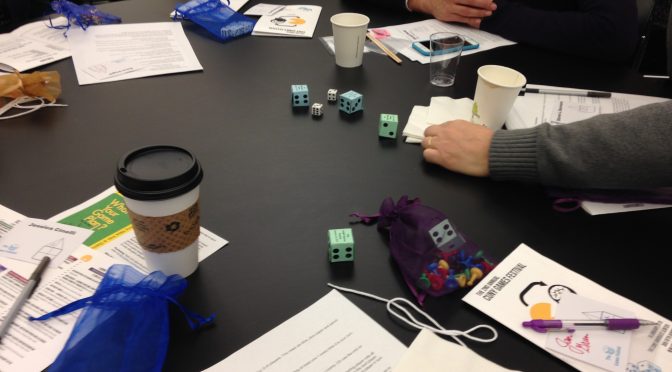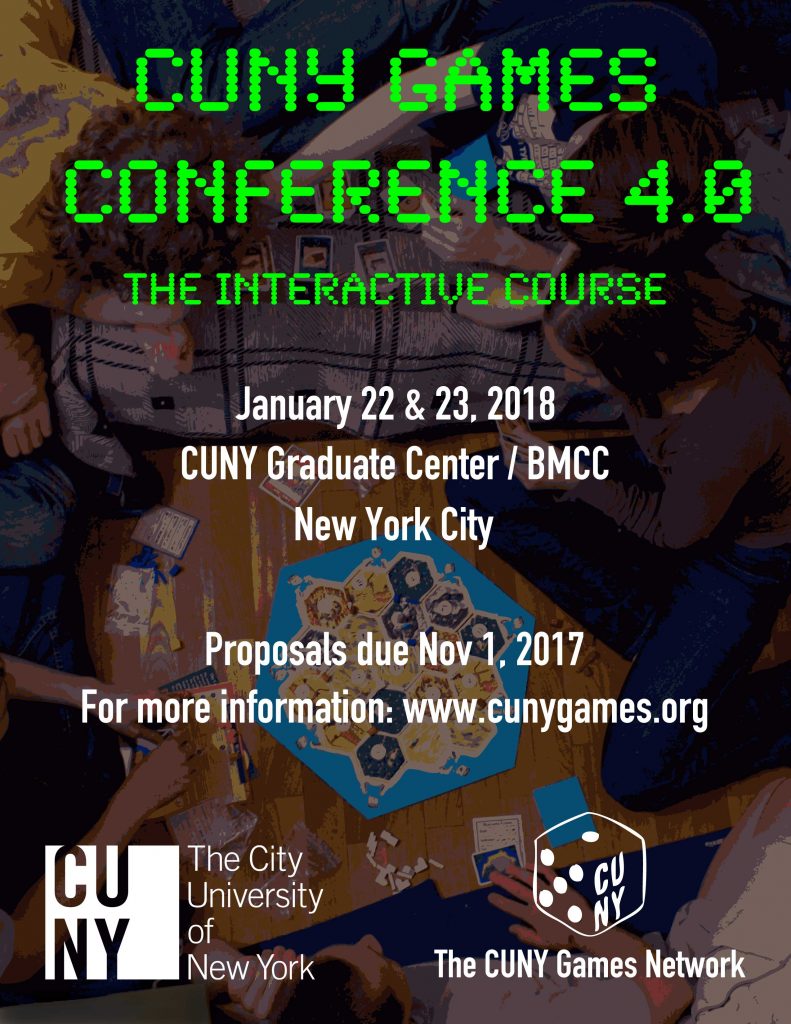Our Call for Proposals is now open! Proposals are due on November 1, 2017. Please forward far and wide!
The CUNY Games Network of the City University of New York is excited to announce The CUNY Games Conference 4.0: The Interactive Course to be held on January 22 and 23, 2018 at the Graduate Center and the Borough of Manhattan Community College in New York City.
The CUNY Games Conference is a two-day event to promote and discuss game-based pedagogies in higher education. The first day of the conference focuses on interactive presentations, and the second day consists of low-key game design, playtesting, and game play.
Game-based pedagogy incorporates some of the best aspects of collaborative, active, and inquiry-based learning. With the growing maturity of game-based learning in higher education, the focus has shifted from whether games are appropriate for higher education to how games can be best used to bring real pedagogical benefits and encourage student-centered education. The CUNY Games Network is dedicated to encouraging research, scholarship, and teaching in this developing field. We aim to bring together all stakeholders: faculty, researchers, graduate and undergraduate students, and game designers. Both CUNY and non-CUNY participation is welcome.
The conference theme is composed of two broad goals:
- To invent, explore, and learn to effectively use Game-Based Learning (GBL) to address higher educational goals.
- To advance understanding of how to create rigorous interactive classroom learning activities, including methods, examples, and assessments, since well-developed learning activities share similar attributes to games.
To meet these goals, proposals should aspire to address the following three areas:
- Innovation: In what way did you invent a new type of GBL or improving existing GBL for higher education? What new applications of GBL were developed to foster and assess learning? In what new ways was GBL integrated with other teaching methods to foster and assess learning?
- Advancing understanding of how people learn in GBL learning environments in higher education: How does your work enhance understanding of how students learn in GBL environments that offer new opportunities for learning? How does your work lead to a better understanding of how to foster and assess learning in GBL environments?
- Promoting broad use and transferability of GBL: How does your work inform the design and use of GBL across disciplines, populations, and learning environments in higher education?
All proposals must have a clear and explicit relevance to higher education.
The conference will feature the following session formats:
Arcade game demos and posters
We encourage everyone to consider bringing something to showcase at our arcade this year, which will be given its own time and space separate from the presentations. The arcade area will feature posters and games (finished or in progress), gamecasting videos, and more. We also especially encourage participation by undergraduate researchers.
30-minute interactive presentations
Reserved for interactive presentations only, such as workshops and live demonstrations. Interactive learning components should comprise at least 15 minutes of the presentation.
10-minute short presentations
Short talks that briefly discuss theories, research, practice, or individual games, including game-like interactive learning activities.
Presenters are encouraged to apply for both the arcade and a presentation. Please submit each separately.
Your proposal must include: session format; contact information for the corresponding presenter; name, affiliation, and email address for each additional presenter; title, 250-word abstract; a paragraph on connections to higher education; keywords selected from a list on the submission form; and special requests (e.g., scheduling or equipment needs). Please proofread and edit your proposal before submission. Accepted proposals will be published in our conference proceedings.
Panel Proposals: We also invite panel submissions for three or more speakers. Please submit one proposal for the entire panel. Innovative panel ideas are encouraged!




